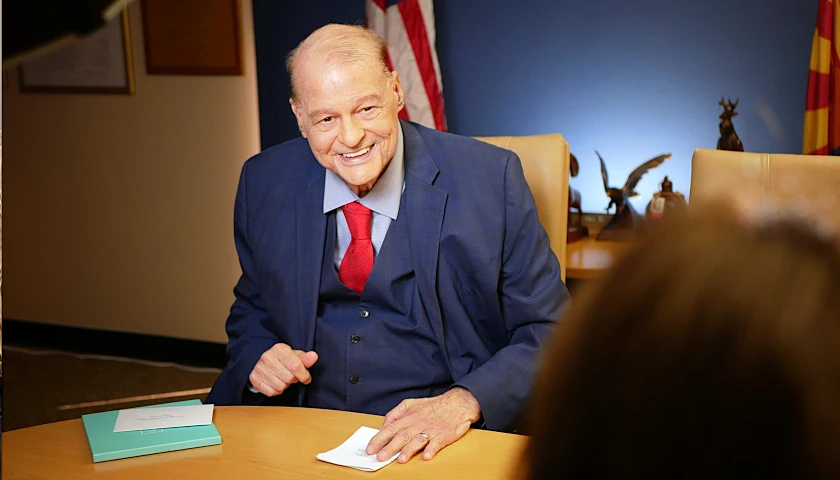Gov. Bill Lee is moving forward on his campaign pledge of school choice in the form of Education Savings Accounts (ESAs) available in 2020, although only about one-half of one percent of the state’s students would qualify to participate in the program’s first year.
The governor delivered his first State of the State address Monday, as reported by The Tennessee Star.
Lee said:
I know there’s concern that programs like this will take money away from public schools, but my ESA plan will invest at least $25 million new dollars in public schools in the first year to fill the gap when a student transfers to another school.
The Tennessee Department of Education referred a request for more information to the governor’s office. Lee spokesperson Laine Arnold did not reply to requests for comment.
The proposal would only be provided to five county school districts: Davidson, Hamilton, Knox, Shelby and Madison (including the city of Jackson). Also included would be the state’s Achievement School District of failing schools, the Chattanooga Times Free Press said.
Only 5,000 students in fall 2020 would be eligible, or only about one-half of one percent of the state’s 975,000 students.
Qualifying students would be eligible for $7,300 each for their new schools, the Times Free Press said. That may increase by up to 2,500 more students a year over three years. Potentially, a total of 12,500 students would be eligible for the program by 2023.
However, the Daily Memphian reported that $7,300 per student would equal only about 3,400 students in 2020, quoting Senate Minority Leader Jeff Yarbro (D-TN-21).
Furthermore, the 5,000 students who qualify would have to come from those five districts that have three or more schools in the lowest 10 percent for performance, the Daily Memphian said.
The number of students in each targeted district are:
- Shelby County: 106,381
- City of Jackson-Madison County: 12,319
- Knox County: 59,364
- Davidson County: 82,424
- Hamilton County: 43,830
- Achievement School District “which operates mostly in Memphis“: 10,979
All told, a little more than 314,000 students in Tennessee are eligible to apply to be among the maximum 5,000 students who can enroll in the ESA program in 2020, while 661,00 Tennessee students will not be eligible to apply for the program in 2020.
Though the specific details of how the “25 million new dollars” promised by Governor Lee for public schools in the first year of the program would be spent have not been released, sources with knowledge of the proposed program say it could work something like this:
The parents of each student would receive approximately $7,300 for academic year 2020-2021 from the already allocated Basic Education Program (BEP) funding that has been provided by the state and has been reserved for distribution to local public schools, referred to as Local Education Authorities (LEAs). Those funds would follow the student to the private or other non-public schooling of their choice. This, then, would mean that the funding available for the LEA where that child would have attend in the 2020-2021 academic year is no longer available for disbursement to the LEA.
The governor’s proposal would place an additional $25 million in new funding into the BEP, which then, in turn, would be disbursed to the LEA based on $7,300 for each former student now attending a non-public school through the ESA program.
Some have pointed out that the math here appears to be a little off. If, for instance, the parents of 5,000 students enrolled in the ESA program in 2020 received $7,300 each from the BEP, that BEP fund would be depleted by a little more than $35 million, which is $10 million more than Governor Lee would provide as additional funding to the BEP in 2020 under his ESA proposal.
Though that $10 million shortfall to LEAs could occur in 2020 if the maximum 5,000 students enrolled in the ESA program, the experience in successful programs elsewhere suggest that the maximum number of actual enrollees is likely to be somewhere between 3,000 and 4,000.
In addition, not every child who enrolls in the ESA program will be leaving a public school. Some will be entering kindergarten for the first. Some will be moving into Tennessee from other states, and some will naturally be moving with their parents from one public school system in Tennessee to another area with a different public school system.
While some ESA proponents have expressed disappointment that only about one half percent of all public school students–and not 100 percent of them–are eligible to participate in the program when it launches in 2020, if it becomes law, the experience of other states that have launched successful education savings accounts programs indicates that such programs only have the capacity to handle a few thousand students in their first year of operation.
For instance, when Indiana launched a similar voucher program in 2011, the program was only able to enroll about 4,000 students in its first year. In academic year 2018 to 2019, 35,458 students are enrolled in the Indiana.
The ESAs in 2020 would not be limited to only private schools and would give parents a debit card containing the state money, Chalkbeat said. Governor Lee’s office, however, has not stated the mechanism by which these funds will be available to parents of students enrolled in the ESA program in 2020.
According to Chalkbeat, parents could use the money on services that include tutoring, online classes, or religious or other private school tuition. Some critics of vouchers say parents in Arizona using a similar system racked up purchases on unauthorized items, although Lee’s staff have said there would be controls to prevent that.
The governor’s office told Chalkbeat that further details on how the ESA works would be revealed when legislation is filed.
Lee’s ESA proposal will be carried in the Tennessee General Assembly as SB795 and HB939, according to the Legislature’s website. The tracking information shows the main sponsors as State Senate Majority Leader Jack Johnson (R-TN-23) and State Rep. William Lamberth (R-TN-44).
The legislation has additional sponsors.
Senate Education Committee Chairman Dolores Gresham (R-TN-26) is listed as a co-sponsor in the Senate. Speaker Pro Tempore Rep. Bill Dunn (R-TN-16) is listed as a co-sponsor in the House.
All administration bills in the Senate are sponsored by Sen. Johnson, but Gresham will “carry” the bill, said Darlene Schlicher, Senate Republican press secretary.
Lt. Gov. Randy McNally of the Senate (R-TN-05) shared his thoughts on school choice.
Adam C. Kleinheider, McNally’s communications director, told The Star, “Lt. Governor McNally has always favored school choice and supports Governor Lee’s proposal conceptually. He looks forward to watching the bill as it moves through the committee system.”
Fox 17 News reported that educator groups often fight vouchers over the possibility of money going to religious schools and fear of losing funding.
“The Governor’s team has their work cut out for them,” JC Bowman, executive director of the Professional Educators of Tennessee, told The Star.
“As the focus on education choice is elevated by Governor Bill Lee, maybe the easiest place to find initial consensus would have been to start with open enrollment,” Bowman continued, adding:
Mandatory open enrollment policies will likely be promoted by the state. This could either be accomplished by funding, new legislation or districts adopting new policies. Intra-district and Inter-district open enrollment policies must be on the table, when the subject of education choice is discussed. The message is that public schools are the best option for parents. Parents should be able to trust public schools to educate all children to the best of their ability.
I have a very close relationship with Governor Lee and his team. I do not always agree with them, and they are still learning to navigate the Tennessee General Assembly, which has the highest turnover in Tennessee history. Their ESA plan needs to be fleshed out more, with accountability measures put in place. Public educators have viewed the plan extremely unfavorable. I continue to think there will be limited seat availability in private schools for students. Rural districts will likely see the least benefit from the plan. Implementation will be the greatest challenge, if the plan is enacted.
Sources tell The Star that the final details of the ESA program may be announced as early as this week.
– – –
Jason Reynolds has more than 20 years’ experience as a journalist at outlets of all sizes.






[…] districts: Davidson, Hamilton, Knox, Shelby and Madison (including the city of Jackson), The Star reported on March 10. Also included would be the state’s Achievement School District of failing […]
This is not school choice. Parents in TN already have school choice. This is our Governor decided that TN taxpayers will now pay for a parents choice. I think this describes redistribution of wealth which is socialism. Take an ESA and your kids will be taught in their new school the same thing they were taught in their failing school. The research already shows ESAs do not deliver the promised results. Why? Because the real reason they are being pushed is to get more kids in the CC/SEL/ DATA PIPELINE. Our new Governor is a fool.